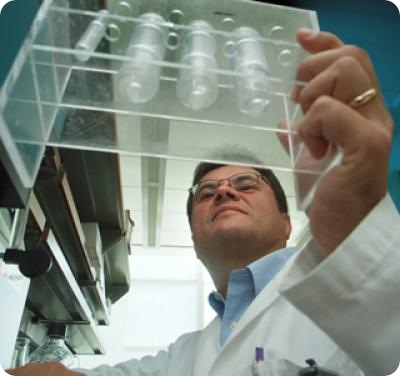Jul 6 2009
The future of organ transplantation could include microscopic beads that create "designer" immune cells to help patients tolerate their new organ, Medical College of Georgia researchers say.
"It's absolutely natural," says Dr. Anatolij Horuzsko, reproductive immunologist at the MCG Center for Molecular Chaperone/Radiobiology and Cancer Virology, who has used the approach successfully in mice with skin grafts.
The degradable microparticles deliver the most powerful known form of HLA-G, a natural suppressor of the immune response, straight to dendritic cells, which typically show the immune system what to attack. The microparticles are given right after a transplant, just as dendritic cells are giving the immune system a heads up to get busy attacking the new organ.
Microparticle therapy likely would be needed for just a few weeks, until the dendritic cells have learned instead to ignore it, Dr. Horuzsko says. "It's like a calming effect and once tolerance is established, we don't need it any more."
His lab reported its success with this delivery method in mice with skin grafts last month in Human Immunology. When researchers compared the success of HLA-G microparticles with the dendritic cell marker to those without a marker, those with were much more efficient at getting where needed and acting, he says. Those without direction likely were consumed by garbage eaters called macrophages.
Unlike current anti-rejection drugs that generally suppress the immune system - leaving patients vulnerable to infections, cancer and more - HLA-G offers specific "tolerance." Fetuses, which also use the compound to escape rejection by the mother's immune system, are good examples of the specific tolerance HLA-G affords, Dr. Horuzsko says.
"We want to create in kidney transplant patients, the same tolerance to the new kidney." Within five years, HLA-G microparticles could be doing just that, Dr. Horuzsko says. He presented the patented process along with his other latest HLA-G findings during an opening lecture of the 5th International Conference on HLA-G in Paris, July 6-8.
Marked microparticles also have treatment potential in diseases where the immune system attacks normal tissue, such as arthritis, multiple sclerosis and inflammatory bowel disease, Dr. Horuzsko says. Conversely the method could be used to deliver a compound to block HLA-G activity, which also is heightened in tumors.
The scientist also is working with Dr. Laura Mulloy, chief of the Section of Nephrology, Hypertension and Transplantation Medicine in the MCG School of Medicine, to determine if higher natural levels of HLA-G already are giving some transplant patients an edge by comparing HLA-G expression in those who keep and reject their transplanted kidneys
Dr. Horuzsko reported last year in Proceedings of the National Academy of Sciences that the dimer form of HLA-G was the most powerful of the known forms and now he and many others are searching for the most powerful dimer, hoping the most successful transplant patients will help them make that call.
HLA-G works through inhibitory receptors, ILT2, ILT3 and ILT4, on dendritic cells, triggering a signaling pathway in which several suppressive molecules get activated to help protect the transplanted organ or tissue. Human leukocyte antigen G, or HLA-G, actually is a member of a gene family called major histocompatibility complex that typically provokes an immune response. Like an errant child, HLA-G instead promotes tolerance, Dr. Horuzsko says.